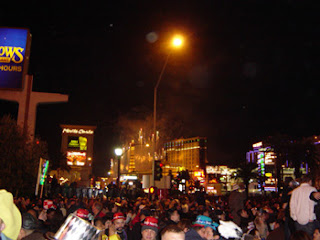Just before New Year’s Eve 2003, something extraordinary happened in three popular partying spots: The arm of the law came down and ordered that information on everyone visiting those respective cities be handed over to the FBI. It was a true Big Brother moment, all in the name of Homeland Security.
The three cities -- Washington, D.C., New York and Las Vegas – were pointed out as possible target cities for terrorist strikes. As history would show, it never happened, but that didn’t stop the frenzy that it might happen. The New York Times' story about the high alert, issued December 21, 2004, read: "Military helicopters and sharpshooters joined fireworks and noisemakers on Wednesday in welcoming the New Year in the nation's largest celebrations."
Then-Las Vegas Sheriff Bill Young told PBS’s “FRONTLINE” producers, “We have 300,000 to 400,000 people on the streets on Las Vegas Boulevard [the Las Vegas Strip] in front of all these beautiful hotels, waiting for the clock to strike midnight and all the fireworks to go off. And that was what the intelligence information indicated, that that was, you know, the type of area or venue that they were going to try to target.”
Then-Las Vegas Sheriff Bill Young told PBS’s “FRONTLINE” producers, “We have 300,000 to 400,000 people on the streets on Las Vegas Boulevard [the Las Vegas Strip] in front of all these beautiful hotels, waiting for the clock to strike midnight and all the fireworks to go off. And that was what the intelligence information indicated, that that was, you know, the type of area or venue that they were going to try to target.”
“Here was the real dilemma,” Young continued. “Do we cancel our New Year's Eve celebration in Las Vegas? That was the question being placed on me.”
So the answer was to hand over the names of everybody staying in town. That meant hotel records, airline records, rental car records, gift shop records and casino records.
People swarmed into Las Vegas anyway to welcome in 2004.
Sheriff Young seemed to justify the heavy scrutiny over his city's guests, telling PBS, “People that come to Vegas, the only time they're not on video is when they're in their room or they're in a public restroom. They don't have them in those. But the hallways, the elevators, the gaming area -- we've taken that to a level that has, I think, surpassed any place in the United States.”
But the high alerts weren’t the only time guests of Las Vegas have unknowingly had their personal information handed over to law enforcement. For years, insiders at Vegas hotels have reported that when someone registers at a hotel or even a small motel, and the hotel desk clerk takes the guest's driver’s license, he then walks behind the lobby where you can’t see him. That’s when he makes a Xerox copy that is later handed over, in a stack of driver’s licenses, to the Las Vegas Metropolitan Police Department. The police, in turn, run the licenses see if there are any outstanding arrest warrants.
Early on, when I was covering the police beat for the Las Vegas Sun, I wondered how, when someone had just arrived in town and wasn’t pulled over for a traffic violation, the cops knew that particular person had an outstanding warrant. I’d see it several times a week in police reports. Or a news release would state that so-and-so was arrested soon after arriving in Las Vegas because he or she was a fugitive from justice.
Once I learned that hotel personnel regularly Xeroxed driver’s licenses of registered hotel guests and handed them over to the cops, then I knew. The police would run the names, then, voila, up would pop the miscreants–an easy collar for police.
That’s the dirty secret most people who come to Las Vegas don’t know about. It’s not just that people are being watched via surveillance cameras in cabs, restaurants, hotels and casinos, but their driver’s license info may be passed on to the authorities as well.
As Gary Peck, director with the American Civil Liberties Nevada office, told PBS in reference to the December 2003 terrorist scare, '"Trust us. We're the government. And if you're not up to no good, why should you care?' That's not the way our system works. We are a country that is founded on a set of principles relating to individual freedom, including our privacy, our right to be left alone by the government."
Well said, Gary Peck.
Such law enforcement scrutiny for New Year’s Eve hasn’t happened since 2003 turned into 2004–at least not that we know of.
Tweet
























No comments:
Post a Comment